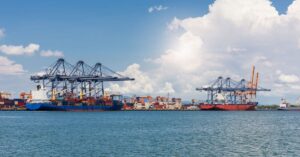
Offshore Supply Vessel Catches Fire Off South African Coast, All 15 Crew Rescued
September 13, 2024
South Africa Launches Investigation To Track Vessel Behind Containers & Pharmaceutical Bottles Washing Ashore
September 13, 2024

A recent joint investigative report by the House Committee on Homeland Security, the Select Committee on the Chinese Communist Party (CCP) and the Subcommittee on Transportation and Maritime Security has warned of the possible risks to U.S. economic and homeland security by Chinese cranes.
The report led by Committee Chairmen, Carlos Gimenez, John Moolenaar, and Mark E. Green examines Shanghai Zhenhua Heavy Industries (ZPMC), a Chinese state-owned company, and its dominance in the global ship-to-shore (STS) port cranes market.
According to the report, ZPMC owns nearly 80% of the STS cranes operating in U.S. ports.
The report reveals that the Chinese Communist Party can use ZPMC as a Trojan Horse to exploit U.S. maritime equipment and technology, which might pose a risk to national security and cybersecurity.
The report details how China’s dominance in global maritime infrastructure poses threats to the U.S. and its allies.
The investigation further inquired into the role of multinational corporations in this security concern. The committees urged ABB, a Swedish-Swiss multinational, to address vulnerabilities in its Chinese-based supply chains for cranes bound for the United States.
However, ABB did not act, prioritizing economic interests over the committees’ security concerns.
While the Biden administration’s recent executive orders on maritime security were acknowledged as positive measures, the report warns that damage might already have been done.
The committees pointed out the need for immediate action by maritime industry stakeholders and the federal government to address these threats to national security.
The House committee’s investigation into the extent of Chinese involvement in crucial maritime infrastructure intensified after the Wall Street Journal reported in 2023 that intelligence-gathering devices were found on ZPMC cranes at the Port of Baltimore.
The committee’s investigation lasted more than a year and includes testimony and data from various stakeholders, including federal agencies, strategic seaports in the United States, and maritime security experts. The inquiry aimed to determine the extent of the possible risks and vulnerabilities posed by Chinese-made port equipment.
Subcommittee Chairman Carlos Gimenez highlighted the urgency of the issue, referring to testimony from U.S. Coast Guard Rear Admiral John Vann, who confirmed that there are “openings to vulnerabilities that are there by design” in current port infrastructure.
Cary Davis, President and CEO of the American Association of Port Authorities (AAPA), praised the committee for focusing on port cybersecurity and recognized the AAPA’s collaborative work with the United States Coast Guard, federal law enforcement, and private sector partners.
Davis stated that due to continuous collaboration and vigilance, there have been no reported security breaches involving port equipment to date. He also discussed the need for forward-thinking solutions, such as waivers for restrictive procurement requirements and incentives to encourage domestic production of essential port equipment.
The report concludes by requesting strategic efforts to protect US port infrastructure from threats posed by Chinese-made equipment. It encourages stakeholders to prioritize cybersecurity measures, strengthen regulatory control, and invest in domestic manufacturing skills to reduce reliance on foreign suppliers, particularly those with ties to the Chinese government.
Reference: House Committee
House Committee Warns Of Cybersecurity Risks From Chinese Cranes At U.S. Ports appeared first on Marine Insight – The Maritime Industry Guide
Source: Maritime Shipping News


